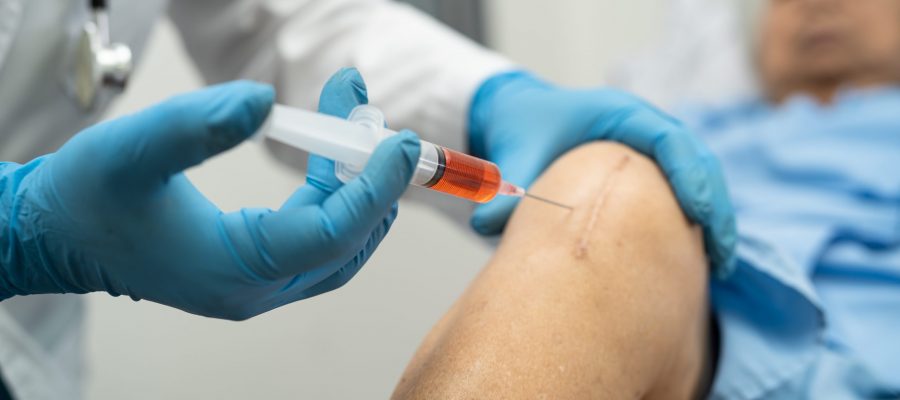
Osteoarthritis (OA) is a common joint condition in Singapore, especially among older individuals. This degenerative condition often affects the knee joint, leading to pain, stiffness, and reduced mobility, which can make even simple daily activities challenging. At Total Orthopaedic Care & Surgery, we specialise in tailored osteoarthritis treatments to help you regain mobility, reduce discomfort, and maintain an active lifestyle.
Managing Osteoarthritis with Knee Injections
Knee injections are a proven treatment for reducing inflammation, alleviating pain, and improving joint function when physiotherapy or medications alone are insufficient. These minimally invasive procedures can also help postpone the need for surgical interventions, such as knee replacement.
Types of Knee Injections We Offer
At Total Orthopaedic Care & Surgery, we offer a range of knee injection therapies designed to address different stages of osteoarthritis. Each treatment plan is customised to your specific condition and goals for optimal results.
1. Corticosteroid Injections
Corticosteroid injections provide fast and effective relief by directly targeting inflammation in the knee joint. These injections can significantly reduce pain and improve mobility, making them ideal for acute flare-ups or moderate to severe OA.
Benefits:
- Quick relief lasting several weeks to months
2. Platelet-Rich Plasma (PRP) Therapy
PRP therapy is a regenerative treatment that uses the healing properties of your own blood. A small blood sample is processed to concentrate the platelets, which are then injected into the affected joint.
Benefits:
- Promotes tissue repair
- Reduces inflammation
- Supports overall joint health
PRP is particularly effective for individuals in the early stages of OA or those seeking natural, non-synthetic solutions.
3. Autologous Protein Solution (APS)
APS is a regenerative treatment designed to reduce inflammation and promote long-term joint health. Like PRP, APS harnesses proteins from your own blood but focuses on specific anti-inflammatory components to address chronic OA pain.
4. Knee Joint Viscosupplementation (Gel Injection)
Viscosupplementation involves injecting a gel-like substance containing hyaluronic acid into the knee joint. This improves lubrication and cushioning, reducing pain caused by friction and enhancing joint mobility.
Best for: Individuals with mild to moderate osteoarthritis looking to delay surgery.
5. Genicular Nerve Blocks
Genicular nerve blocks are a pain management treatment that targets the nerves supplying the knee joint. By injecting a local anaesthetic near these nerves, this procedure temporarily blocks pain signals, providing relief for individuals with persistent knee pain.
Benefits:
- Effective for managing chronic knee pain
- Minimally invasive with quick recovery
- Suitable for individuals who may not respond to other treatments
Genicular nerve blocks are often used for advanced osteoarthritis or as a diagnostic step before considering further interventions like nerve ablation.
Which Knee Injection Treatment is Right for Me?
Selecting the most suitable knee injection treatment depends on several factors, including:
- The severity of your osteoarthritis
- Your daily activities and lifestyle
- Your long-term goals for mobility and comfort
Treatment Recommendations:
Corticosteroid Injections
Ideal for severe pain or acute flare-ups requiring quick relief.
PRP or APS Therapy
Effective for early-stage OA and regenerative treatment goals.
Viscosupplementation
Suitable for mild to moderate symptoms, improving mobility and delaying surgery.
Genicular Nerve Blocks
Best for managing persistent knee pain, especially in advanced stages of OA.
A consultation with our orthopaedic specialists will help determine the best treatment plan tailored to your condition.
Benefits and Risks of Knee Injections
Benefits:
- Significant pain relief
- Improved joint mobility
- Delayed need for invasive surgery
- Enhanced quality of life
While risks are minimal, they can include:
- Temporary discomfort at the injection site
- Mild swelling or redness
- Rare cases of infection
At Total Orthopaedic Care & Surgery, we ensure precision, safety, and sterile techniques during all procedures, prioritising your comfort and peace of mind.
How to Prepare for Your Knee Injection
Preparing for your knee injection at our clinic is a straightforward process. During your initial consultation, we’ll assess your condition, review your medical history, and discuss your symptoms in detail. If necessary, we may arrange for imaging tests like X-rays or MRIs to gain a more thorough understanding of your joint health.
Before the procedure, our Orthopaedic Surgeon will provide personalised guidance to help you prepare, including recommendations tailored to your lifestyle and specific needs.
What to Expect During and After Your Procedure
During the Procedure:
- Knee injections are quick, minimally invasive outpatient procedures.
- The injection site is thoroughly sterilised, and imaging guidance may be used for precision.
- The procedure involves minimal discomfort and is completed within minutes.
After the Procedure:
- Rest your knee and avoid strenuous activities for a short period.
- Apply ice packs to reduce any minor swelling.
- Follow-up appointments will be scheduled to monitor progress and adjust your treatment plan if needed.
What to Expect During and After Your Procedure
At Total Orthopaedic Care & Surgery, we are dedicated to helping you take control of your osteoarthritis and live life to the fullest.
Why Patients Trust Us:
- Personalised treatment plans tailored to your needs
- Expertise in advanced, evidence-based knee preservation treatments
- Patient-focused care with a commitment to safety and comfort
From your initial consultation to recovery, our experienced specialists are with you every step of the way. Let us help you move better, live better, and regain your confidence.
Contact Us Today!
Schedule a consultation with our team at Total Orthopaedic Care & Surgery and take the first step toward managing your osteoarthritis effectively.
Please note that the provided content is for informational purposes only and should not replace professional medical advice.



